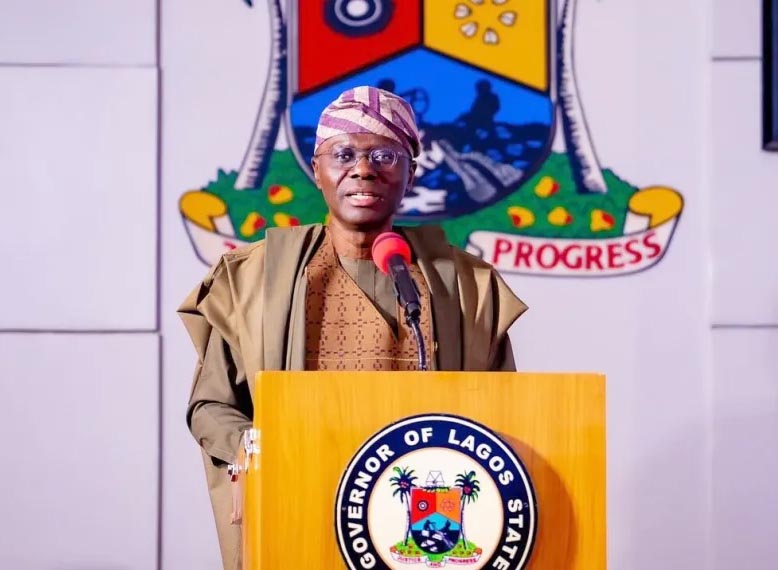Lagos State Governor, Babajide Sanwo-Olu, has reaffirmed his commitment to positioning the state at the forefront of Nigeria’s ambition to achieve a $1 trillion economy by 2030, with a focus on innovation, technology, and strategic partnerships.
Speaking on Tuesday at the opening of the GITEX Nigeria Tech Expo and Future Economy Conference 2025 in Lagos, Governor Sanwo-Olu said the state is central to Africa’s digital transformation and Nigeria’s economic growth plan.
The governor noted that Lagos is home to 23 of Nigeria’s fastest-growing companies, as recognised by the Financial Times, attributing the feat to a vibrant innovation ecosystem supported by forward-looking policies, private sector investments, and a resilient startup culture.
“We’re not just showcasing technology today; we’re forging partnerships and igniting innovation to propel Nigeria toward its $1 trillion economic target,” Governor Sanwo-Olu said.
The governor’s remarks align with President Bola Tinubu’s broader vision of building a $1 trillion national economy.
The GITEX Expo, jointly organised by the Lagos State Government, KAOUN International, the Federal Ministry of Communications, Innovation and Digital Economy, and the National Information Technology Development Agency, is one of the largest gatherings of global and local tech leaders. Companies participating include IBM, Meta, MTN, AWS, Cisco, and dozens of Nigerian startups.
“Lagos is not just a city; it is a movement,” Governor Sanwo-Olu told participants, urging innovators and investors to seize opportunities that will place Nigeria and Africa firmly on the global digital map.
He also praised the Minister of Communications, Innovation and Digital Economy, Bosun Tijani, for championing artificial intelligence infrastructure and inclusive digital solutions that are reshaping Nigeria’s technology landscape.
In his remarks, Mr Tijani noted the urgency of strengthening digital infrastructure to meet Lagos’ rapid urban growth, noting that the city welcomes about 2,000 new residents daily.
He announced that the government will, from 1 October, fund 75 new digital research projects to deepen collaboration among Nigerian researchers, entrepreneurs, and the diaspora.
The minister stressed that stronger partnerships among startups, corporates, and government were critical to scaling innovation and building resilience in Nigeria’s digital economy.
Pursuing set goals
The Sanwo-Olu administration has in recent months unveiled several initiatives to align Lagos with its growth vision.
In May, Commissioner for Agriculture and Food Systems, Abisola Olusanya, projected that Lagos’ population would reach 24 million by 2030, raising annual food demand to nearly N8 trillion.
She said the state would need to boost local production by at least 20 percent annually to cut import dependence and achieve 40 percent self-sufficiency.
In July, the government announced plans to launch the Lagos State Industrial Policy (LSIP 2025–2030), a roadmap aimed at revitalising the state’s industrial sector and attracting targeted investments.
Commissioner for Commerce, Cooperatives, Trade and Investment, Folashade Ambrose, said the policy is designed to enhance global competitiveness of Lagos-based industries.
She linked the initiative to two upcoming high-profile events — the Lagos Investment Summit 2.0 and the Africa Social Impact Summit (ASIS) — which the state is hosting in collaboration with the United Nations System in Nigeria, Sterling Bank, Arise News, and the Office of SDGs.
The Lagos Investment Summit 2.0, themed “Scaling Action: Bold Solutions Towards Making Lagos a 21st Century Economy”, will spotlight opportunities in smart city solutions, green energy, fintech, civil infrastructure, and agribusiness.
Mrs Ambrose added that ASIS will focus on structural reforms, ESG standards, and sustainable financing to drive equitable development.
Special Adviser to the Governor on SDGs, Oreoluwa Finnih, described the summits as aligned with the Lagos State Development Plan (LSDP 2052), which sets out a long-term vision for making Lagos a globally competitive economy.
PREMIUM TIMES





